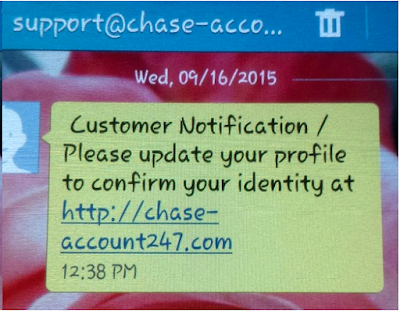The Better Business Bureau (BBB) is warning consumers about a new text message scam that's fooling people into sharing their personal information with thieves.
The scam
The BBB says con artists are sending people text messages that appear to look like an alert from their bank. The message says you need to update your profile information and then provides a link to a website. The URL may even include the name of your bank.
According to the BBB, once you click on the link, it takes you to a form that appears to be on the bank's website. The page will then ask you to "confirm" your identity by entering your name, user ID, password and/or bank account number. Do not do it! And even if it really is your bank sending you a message, don't risk the possibility that it's not. Taking the time to log in to your online bank account through a secure network is a lot easier than the trouble you'd be dealing with after thieves get their hands on your personal information.
Text scams are nothing new and the BBB warned consumers about a similar one back in 2013.
The lesson: Even if a message appears to be from a trusted source, don't trust it!
Here's a general rule of thumb for avoiding these types of scams: Do not click on any link in any email or text message that you were not expecting. If there's a question and you think there's a legitimate message or notification intended for you, go directly to the official website of whatever business it is and check for any notifications there.
If your bank needs you to update your profile, you should be able to find that information by logging in to your account separately through the official site -- or by calling your bank directly.
Here are some additional tips from the BBB for you to protect yourself from text message scams:
The lesson: Even if a message appears to be from a trusted source, don't trust it!
Here's a general rule of thumb for avoiding these types of scams: Do not click on any link in any email or text message that you were not expecting. If there's a question and you think there's a legitimate message or notification intended for you, go directly to the official website of whatever business it is and check for any notifications there.
If your bank needs you to update your profile, you should be able to find that information by logging in to your account separately through the official site -- or by calling your bank directly.
Here are some additional tips from the BBB for you to protect yourself from text message scams:
- Just hit delete! Ignore instructions to confirm your phone number or visit a link. Some scam texts instruct you to text "STOP" or "NO" to prevent future texts. But this is a common ploy by scammers to confirm they have a real, active phone number.
- Read your phone bill. Check your phone bill for services you haven't ordered. Some charges may appear only once, but others might be monthly "subscriptions."
- Know your rights. Real commercial text messages must provide a free, easy way for you to opt out of future communication.
- Know how to combat spam texts. In Canada, an anti-spam law covers text messages. Learn more about reporting and fighting spam here. In the U.S., forward the texts to 7726 (SPAM on most keypads). This will alert your cell phone carrier to block future texts from those numbers.
- Watch out for look-alike URLs. Just because a URL has the name of a real company in it, doesn't mean it's legitimate. Anyone can register a sub-domain (realcompany.website.com) or similar URL (realcompany1234.com).
- Ask your phone carrier about blocking third-party charges. Mobile phone carriers permit outside businesses to place charges on your phone bill, but many carriers also allow you to block these charges for free.
- Protect your information
If you're looking for mobile security, try a freemium service called Lookout.com, which offers protection for smartphones running Android, Blackberry, or Windows. And don't forget antivirus on your computer at home too. Check out Clark's list of free options for virus, spyware, and malware protection.


